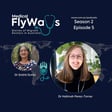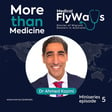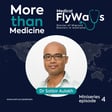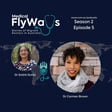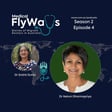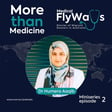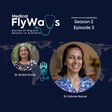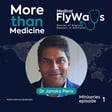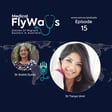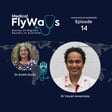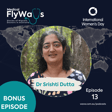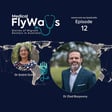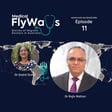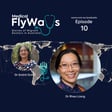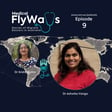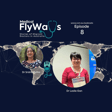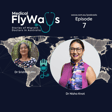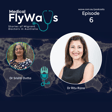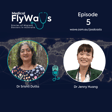Become a Creator today!Start creating today - Share your story with the world!
Start for free
00:00:00
00:00:01

More than Medicine Episode 3 - Dr Arya Shahrdami
Dr Arya Sharhdami learned English from scratch to help facilitate a move from Iran to Australia. Drawn to Tasmania for the breathtaking photography opportunities, he now lives with his family in Launceston and balances his career as a GP with his love for photography.
Recommended
Transcript
Introduction to Medical Flyways
00:00:01
Speaker
Medical Flyways, the untold journeys of migrant doctors in Australia.
00:00:13
Speaker
Thank you so much for joining us again for another episode of the mini-series we're recording.
Introducing Dr. Arya Shadami
00:00:18
Speaker
Today I have with me Dr. Arya Shadami. Arya is a GP in Launceston in Tasmania and a GP with a very specific or special interest as well.
00:00:29
Speaker
In addition to that, he has quite skilled repertoire in the range of nature photography. or outdoor photography. And that's how I originally found him through social media, like so many other things we find through there.
00:00:46
Speaker
Welcome to the episode, Aria. Thank you very much for having me. I'm very happy to you know have a chat today with you. Thank you
From Iran to Australia: Dr. Shadami's Journey
00:00:55
Speaker
so much, Aria. Now, one of the things I wanted to start with is sharing a little bit about your journey of how you have you kind of traversed the journey from being a new doctor in Australia to being an experienced GP in Launceston.
00:01:11
Speaker
I'm originally from Caspian Sea coast, north of Iran. i studied my primary degree over there. Then when I met my wife in 2008, it was her plan to move overseas.
00:01:24
Speaker
She was a nursing student. I was a medical student. It was her plan to go to Norway. And then as when our relationship became more serious.
00:01:34
Speaker
Then I said, why going to Norway? Norway is too cold. Let's go to Australia. know And that was the beginning of the journey, thinking about Australia and ended up coming to Australia.
00:01:46
Speaker
Well, that sounds similar to ours because when we moved from UK where I met my husband, the choices were Canada or Australia. And I think like you, we both were not keen to go somewhere colder than the UK.
00:01:59
Speaker
Although I'm told Canada has more sunshine. So, yeah. So what were you looking for? mean, it sounds like both of you were interested in moving overseas. Were you looking for more study, more career opportunities? What was the kind of rationale for choosing to move?
00:02:17
Speaker
The main thing, as you probably know, in Iran, because of the issues with social freedom, you know, freedom of the speech, and especially for women, you know, so that was probably the most important motive for us to move overseas, you know.
00:02:33
Speaker
And I personally, I don't like, you know, chaotic system. I'd like to plan things ahead, 10 years ahead, you know. And with the system over there, with the lifestyle, you know,
00:02:46
Speaker
It was hard to plan things ahead and and achieving goals as planned. So that was another reason we'd like to move to more developed country.
00:03:00
Speaker
And how did your family or those who ah would otherwise have had access physical access to you respond to your decision to move away? Or was it acceptable by that time, given the situation in the country, that that would be a natural choice to make?
00:03:16
Speaker
Yeah, look, it's it's quite difficult situation at that time to make that decision. Even my classmates at that time thought, you know, I was kind of crazy to do that because I didn't i couldn't speak English at that time.
00:03:29
Speaker
I didn't have the money either, you know, so had to go to a rural area for a few years to work quite hard, save money. And at that time, one Australian dollar was 2,700 of our currency that time.
00:03:43
Speaker
So I had to save a lot of money to come to Australia, you know.
Family and Cultural Adaptation
00:03:48
Speaker
So definitely for family, it was difficult as well. But, you know, i made clear that this is what I want for my future. And, you know, and I have do that.
00:04:00
Speaker
And fortunately, my parents, they eventually and understood myself. Yeah, yeah. ah So I've known and through conversations with other colleagues that in learning or knowing English is something that I have as a privilege growing up in post-colonial India and having good education access. But English is something that is not required even with tertiary education in Iran.
00:04:26
Speaker
So was that translation to a new language, which you probably have to use all the time living in Australia. How does that translate to someone who comes to work as a doctor in this country?
00:04:42
Speaker
Let me explain a bit more. In Iran, we we learned a lot of vocabularies and some basic grammars at high school. But as you mentioned, even tertiary education, is is we don't use English, it's just Persian.
00:04:57
Speaker
The thing is, if someone wants to speak English and understand like English movies, we have to go to private English classes, otherwise we don't have an English environment. So...
00:05:09
Speaker
When I was at uni, i could read English books, but, you know, I used to use Persian subtitles for watching movies, you know. I went 120 sessions of private English classes and I watched couple of hundreds of movies a year to for my ears to get tuned, you know.
00:05:28
Speaker
And after two years, you know, I eventually, you know, could understand English movies. And then coming to Australia, you know, from a different culture, you know, someone who comes from, say, Canada, from the US or UK, you know, it's not, but I would say, list it's less difficult, you know, than me coming from a different background, know, to Australia.
00:05:49
Speaker
And, you know, when I came to Australia 10 years ago, you know, after passing my English exam, it took me four and a half months, I remember. exactly four and half months for my ears to get tuned to Australian accent.
00:06:04
Speaker
you know That was thing. And then the slangs. I remember one day I went into the post office and the lady said, oh, I'm just pulling your leg. was like, excuse me?
00:06:17
Speaker
And she realized that I don't have that background. And then she explained to what that slang means. So it was funny. Oh, that's very kind that she did explain it to you subsequently. So yeah, that is interesting. I still remember my first clinical observership was in a part of the UK north in Yorkshire called Barnsley.
00:06:37
Speaker
And Barnsley has a Barnsley accent. So you'd think that in the country from where English has come, you know, Queen's English is not spoken across the whole of the UK.
00:06:49
Speaker
And in spite of knowing English and understanding it and having heard it for the majority of my life, I could not understand much either. So thank you for sharing that because I think when people say had to learn English, those who are learning another language here might equate it to that. But to be conversant in a language is another step in learning that, isn't it? So you knew English. To be conversant at the level you were comfortable with was a different level.
00:07:18
Speaker
Yeah, that's right. Well, colloquialisms aside, it sounds like you've settled well where you are. So what made you choose Launceston or Tasmania? Well, good
Settling in Tasmania
00:07:29
Speaker
question.
00:07:29
Speaker
When I started you know my journey of you know working as a GP in Australia under supervision, when I started to go through you a fellowship program with RACJP, I started working as a practice in south of Newcastle, in New South Wales.
00:07:48
Speaker
And then i got my permanent re residency through my wife. And then ah we had to move to Tamworth. Because of becoming a permanent resident, they said, okay, now we consider you as Australian.
00:08:03
Speaker
So you have to go to ah rural area, you know, regional rural area. So then we moved to Tamworth. We worked and lived there for about almost three years and I finished my FRACGP.
00:08:17
Speaker
Then at that time, still I had some years of my moratorium left. So that means I wasn't allowed to you know go to the capital cities. which I wasn't keen either, you know, because I'm from, you know, rural area, north of Iran.
00:08:34
Speaker
like more smaller cities, you know, regional area, not bigger ones. um So it was our time to to choose where we want to live forever, hopefully. So among the choices we had, one was Geelong.
00:08:49
Speaker
That was the early days of my photography when I was in town, which 2018, 2019. I saw a lot of you know photos and on Instagram and social media.
00:09:03
Speaker
and I was following a lot of photographers, I loved the photos from Tassie, you know, and I was warned many friends and colleagues that Tassie is cold. If you go there, you get disappointed and, you know, I'm sure you'll be back after six months. My super supervisor was telling me that at that time.
00:09:22
Speaker
And i was like, look, if I don't go there, I never get to know, you know. You'd have regretted it if you'd not at least tried it, yes. That's right.
00:09:33
Speaker
ah Look, I think in my life, I've made three decisions. One was you know, marrying to my wife. The second one was moving to Australia.
00:09:45
Speaker
The third one was coming down to Tassie.
Photography and Stress Management
00:09:48
Speaker
It changed my life. In what way? First of all, I got a job offer.
00:09:56
Speaker
At that time, from e skin clinic in Tassie, I always wanted to work in the skin cancer field because I found my passion during my training.
00:10:08
Speaker
And I found my talent in surgery as well, which was interesting that I wasn't aware before, you know. And so work-wise, it changed my life.
00:10:19
Speaker
I found the skin clinic. I actually worked so hard to you know expand my skills in that area. And the second reason is photography. you know ah found the best place in in the whole country a photographer. you say I'm absolutely sure that all the Tasmanians will agree with you on that, at least, if not all Australians. so yeah so and And what was it that drew you to photography?
00:10:50
Speaker
The first reason I started was a stress. you know During the GP Fellowship Program, I was under so much a stress. I was trying to find a way to distract myself.
00:11:05
Speaker
That was the reason i started learning photography from YouTube. And then I got the bug of photography. and One of the issues I have, if get interested in something,
00:11:17
Speaker
I get to the bottom of it, you know. You're an all-in person. Yeah, I'm on a goal-oriented person, you know, and and after about five to six years of photography, I have some goals to achieve. So we'll see how it goes.
00:11:31
Speaker
What were the initial goals then? And then i'm I'm probably more curious because I'm a person that has 200 hobbies. And before I know it, I found another thing to be interested in. I'm the other end of the spectrum, possibly like from you, which is I have too many, and not one.
00:11:47
Speaker
So when you start off with something like this, like you said, you learned it through YouTube and you'd been watching the work of others. Like, how does someone start in... The first thing that comes to my mind is expensive equipment, unfortunately.
00:12:03
Speaker
So where do you start? Do you start with just experimenting? do you start with buying equipment? If someone else is listening to you out there and they're doing their fellowship and are stressed and going, hmm, I might try this, what's the next step?
00:12:18
Speaker
Well, the thing is, first of all, as you mentioned, photography is a very expensive in hobby, you know, and depends on what you want to achieve, you know.
00:12:29
Speaker
If you want become a professional, at a professional level, you know, to get recognised, you spend a lot of time. you know the thing is, I remember when I started my photography journey, I was taking like thousands of photos, you know especially if you're self-learning, you're not going to any you know ah workshops or anything. I've never been to any workshops. you And if you want to achieve everything,
00:12:59
Speaker
So higher level, you need to expect that you're going to spend some money buying nice camera, especially if you want to get into night photography, you know, you need to have nice lenses as well, you know, a low light capability.
00:13:16
Speaker
so start simple. Look, if you need something just for distraction, yeah you can go simpler, you know, a cheaper camera, you know, a versatile, you know, a lens that you can use for like travel photography, for daytime photography.
00:13:34
Speaker
But if you want to get into night photography, if that that is, you know, your interest, then I suggest buying a better camera from the beginning and a good lens as well, yeah.
00:13:44
Speaker
I've got a thought in my mind. You've picked up two sub-interests, interests or main interests that both involve lenses, right? You've got demoscopy and then you've got photography.
00:13:55
Speaker
You know, there must be something about looking through lenses that interests you in some way. Is it about perspectives? What is it? A philosophical view on it, I suppose. Yeah, very good question.
00:14:06
Speaker
I'm not a good listener, you know, you can ask my wife, you know. I learn and I enjoy visually yeah visually, you know, always being like that, you know, always ah need to see things, you know.
00:14:20
Speaker
and And for me, that's why I like skin, that's why I like surgery, that's why I like thermoscopy. you know, visually it's pleasing, you know, same as photography, I never get tired of you know seeing good photos.
00:14:36
Speaker
That is very true. And for those who have seen your photos, they would see the same, which is they don't get tired of seeing yours. So we have had a few interactions through social media where I certainly have noticed your, don't know, unconscious way of teaching or sharing your knowledge.
00:14:56
Speaker
in both the domain of skin cancer as well as photography. And as an example, I'll share with my listeners often on one particular social media group, if people ask about a particular skin lesion, there are many who might comment with a description of what they might do to manage it.
00:15:15
Speaker
But when you respond, I always see a photo, you've drawn out what you would do with it, and you've given a rationale of how you would do it. So, you know, how can you be a good teacher without being a good learner?
00:15:29
Speaker
So what what drives you to do that? What's your interest in terms of sharing that so generously, if not anything else? Very interesting. I've seen a lot of teachers...
00:15:42
Speaker
and In medicine, you know most of them are cliché. They just follow the same in know style. and I would say as a learner, I get bored you know if it's not engaging. you know For example, for dermatology, I signed up for some courses I went through a bit and then I stopped because they were boring, they were cliche.
00:16:05
Speaker
And I could do that by just, you know, reading you know the books, you know. But after a long, long time, I found ah Dr. Ian McCall, who is one of the best teachers I've ever, you know, had so far. You know, it's the way that i would teach education.
00:16:21
Speaker
you know medicine as well. So same thing when people ask me about how I would manage you know that sort of skin cancer, you know I put myself in their shoes at the level that the doctor is, especially the junior or less experienced doctors when they ask these questions.
00:16:40
Speaker
I've been through what they are what they are having at the moment, you know, so I put myself in their shoes. So I try to be specific, I try to give them some hints that, you know, you don't find them in workshops, you know.
00:16:54
Speaker
When you work for some years, you find some very delicate things through the process that you feel like, oh, okay, that was the problem I needed to know, you know, so...
00:17:06
Speaker
Those are, i think, precious hints that can help others. you know and When you share, having said that, again, some people, they don't share everything. you know They say, if I share everything, then I don't have anything else to share later on. But I think if I share what I learned, then i go and I learn more.
00:17:29
Speaker
It's a little addictive, that thing, isn't it? Yes, I can certainly relate to that. And so I noticed it because I saw that in your comments on the photography group as well as the skin cancer group.
00:17:41
Speaker
And I have to say, I've learned from both those groups. When you comment, I always read it. To the point where now when I use my Apple phone to take photos, I'm just looking at that that grid that comes up in there.
00:17:54
Speaker
Remember the three by three on the that comes when you're taking a photo? how the So I didn't know that. And I think many people in the group didn't know that there is a particular way to frame the photo through the iPhone.
00:18:08
Speaker
Would you mind sharing that with the audience? Because I was quite blown away that it's such a simple thing in a phone that none of us have actually figured out. Yeah, that that's the grid that you can find them mean you can find it in the setting. It's a rule of third. It's one of the basic you know composition rules that you put your main subject on one of the intersections of the grid that you see on the on the screen.
00:18:33
Speaker
that That's pleasing to the eyes. you If you see a photo that's pleasing, that means that you know it has used some compositional rules. The thing is, the people who are not into photography, they don't know the rules. know But you know nowadays, when i look at the photo, I can't tell even what sort of editing has been done. It's because of all the work that I've done over the last six years.
00:19:00
Speaker
Well, I'm not a photographer, I will tell you that much, but I do use my phone, so I often look at whatever can be applied in my iPhone. And it's it's fascinating that does having or knowing the rules make the pleasure or joy any less?
00:19:15
Speaker
it It helps a lot. I would say anyone who wants to start photography, if if they get to know the compositional rules, literally they start taking better photos, you know.
00:19:27
Speaker
They actually enjoy it more too then, because they know what they're doing. yep Yeah, yeah. You asked me about ah how to start doing photography. To be honest, I think I highly recommend starting with the phones.
00:19:41
Speaker
And there's a very famous word and in photography. It says the best camera is the one that you have in your hands, which is your phone. And nowadays, we have quite nice cameras, even for night shots, you know.
00:19:56
Speaker
There are a lot of materials and educational videos on YouTube that people can go and watch and learn. Awesome. Now, with the work that you've done so far, I know you've created, certainly for those of us that were interested, calendars and it's been your way of raising money for charity as well.
00:20:17
Speaker
Was there a particular goal related to that or was it simply an opportunity that you saw when there was appreciation for your work within the community, the medical community, I suppose?
00:20:29
Speaker
Well, I always enjoyed contributing to charities and and the community.
Community Contributions through Photography
00:20:35
Speaker
you know When I started making calendars, the main reason was to raise some you know money for the charity.
00:20:44
Speaker
So I started donating all the incomes some of my photography, even the printing. That's the way of you know contributing to my community other than what I do work-wise.
00:21:00
Speaker
And I enjoy it as well, you know. And also people enjoy the photos as well. At the same time, the money goes to the charity. It's a win-win for you.
00:21:11
Speaker
win-win for both sides, you know. Both sides indeed. And as you mentioned about the print, so is there an external website or somewhere that your work is available for people to see or where they can order from?
00:21:23
Speaker
Yeah, I don't have any website at this stage. I'm too busy to have a website. Not yet. Okay. I have a instagram photography Instagram account, aria.s.photography.
00:21:37
Speaker
If anyone is interested, can send me a message through my Instagram instagram account, then I send them a print. Awesome. Have you done any photography outside of Tasmania?
00:21:47
Speaker
I've done a bit in Norway and of years ago in 2023. Was there anything in particular you were you went looking for? There's certain things people go for to the Scandinavian countries.
00:22:01
Speaker
Yeah, well, as you probably know, Norway, especially northern Norway, Lofoten Islands and and Iceland, they both are amazing in the locations for photography and you never get tired of you know visiting these two places. yeah I went there in the middle of the summer, so like we went to Lofoten Island in northern Norway at the end of June and there was no darkness at all. It was amazing.
00:22:30
Speaker
I went mainly for visit, but and we went to Iceland mainly for the waterfalls like Escobar Falls, which was magnificent.
00:22:41
Speaker
So is there anything else planned in terms of Australian landscapes outside of Tasmania? ah would love to go to actually New Zealand. Either if I'm going to go to New Zealand, and that was another thing that I was going to mention. Photography changed my life in different ways. I travel differently.
00:23:00
Speaker
I travel different seasons. I chase the light. I chase the best lights and the colors nowadays. So if I'm going to go to New Zealand, either go sometime in mid or late April.
00:23:14
Speaker
for the autumn colour and beautiful colours of the sky at that time, or if I'm going to go in summertime ah spring, summer, I would go late November, which is the the season of the lupines, the most beautiful flowers in in New Zealand.
00:23:35
Speaker
And again, That's the time that, it's the time equinex and you get more colors in the sky with the flowers in the background. It's gorgeous. Oh my God. I have to say, it sounds like learning more about photography means learning more about what you enjoy yourself as well.
Photography's Influence on Travel
00:23:53
Speaker
And what nature, like, you know, I did not know that the equinox would have that effect. So it is pretty transformational from what you're describing. What does your other half think of this pursuit and what it takes away from or contributes to in terms of your life together?
00:24:10
Speaker
Well, the good thing is, Although my wife was born in a big city, you know she always enjoyed the nature and outdoor.
00:24:21
Speaker
She loves hiking, same as me. So we both are on the same page. We love going in the nature and we both like flowers, we like beautiful sky colours. Well, that sounds like a positive contribution there. Yeah, yeah.
00:24:39
Speaker
And the other question I was meaning to ask you, but I didn't get to, is in terms of the work that you do outside medicine, I certainly think, you know, in medicine, it's very structured. You're an intern, you're a JMO, you're, ah you know, like,
00:24:52
Speaker
the level at which you feel comfortable and your competence is very objectively laid out for you. When you're doing something like photography, at what stage do you feel comfortable sharing your work and how do you find those communities or networks where you might not be formally taught, but informally you might find mentors or people that you learn from? i think The best thing is following photographers.
00:25:23
Speaker
You see their work. Every work that you see is the way that that photographer is looking at things. So you learn from their perspectives.
00:25:36
Speaker
And then, you know, by learning that, you put them into practice and you you're practice more. And then they see your photos as well.
00:25:46
Speaker
So by, know, following each other, you know, you learn from each other. ah You're wondering about, you know, like how, you know, you mentioned supervision and a supervisor and medicine, you know, so we're very structured about these things.
00:25:59
Speaker
In a skill like in an arts-based world, do you find mentors? Do they find you? Like, I'll give you an example. When I was in the UK, my other half had an interest in photography and there was a local photography club.
00:26:14
Speaker
which he joined for some time, which which was a you know way to put aside some time towards an interest. Are there better ways to connect with people now? like Because we have so many other ways.
00:26:26
Speaker
Yes, there are some photography clubs, you know, and probably in each city. You know, here we have it as well. Also, there are some people who actually organize some workshops that, you know, if anyone is interested, they can so for those workshops as well.
00:26:43
Speaker
I personally, i learned everything from YouTube. And I think YouTube has a lot of materials, you know. You can learn from ah basic photography to more advanced photography. There are a lot of people who actually share their knowledge on YouTube, which is amazing.
00:27:01
Speaker
And it's underrated. you know Photography is a matter of practicing. you know Over time, you get better and better. Like your skin cancer too, ah yeah which you're pretty good at as well, having seen your work already in in what you share.
00:27:17
Speaker
And it logically leads me to my next question is your sharing is already very generous. Have you or would you in future consider formally or informally mentoring other people or teaching other people?
00:27:30
Speaker
Where does it fit in your plans? Yeah. It's definitely planned down the track to mentor you know some other doctors. Probably not at this stage, but it is and denness ah know in maybe three years, five years time would be ready.
00:27:49
Speaker
ah the moment, as I mentioned, I'm working on myself. and different other ways as well to just learn more, become a more well-rounded doctor in the skin, not just a skin cancer.
00:28:04
Speaker
I'm learning a lot at the moment in general derm, but I'd like to get more experience in general derm and also, you know, maybe some laser treatment down the track as well.
00:28:17
Speaker
Once I get to that level, will be more comfortable to formally introduce, yeah. Teach or? Yeah. That sounds like someone we're going to see many benefit from it. Well, you already share very generously already. That will continue.
00:28:35
Speaker
And the other question I had, and and I think this is a question a lot of us get asked is, what does balance or work-life balance mean to you?
Balancing Work and Personal Interests
00:28:44
Speaker
And what does that look like in the next few years?
00:28:48
Speaker
Look, I personally, I love my job. I really enjoy it. and But it's it's a job and it can get overwhelming as well. I think for me, work-life balance means that doing enough photography, is spending enough time with my wife and also traveling.
00:29:08
Speaker
you know, if I work too much, if I don't get any time travel, I feel that can affect me, you know. So it's important to make that balance.
00:29:22
Speaker
I think at at this stage, um think I think I've got a reasonably good life and work balance, which I'm happy with, doing enough photography and traveling a bit as well.
00:29:34
Speaker
It sounds like you're quite conscious and intentional about maintaining that balance. And it's ah it's an interesting part of already being more rounded off than I suspect many of us are.
00:29:48
Speaker
ah So I quite appreciate that you've got this balance and maintained it. Was there any particular specific tips that you would like to give anyone who is only starting their journey to come to Australia to become a doctor or a GP as the last words from you?
Advice for Aspiring Migrant Doctors
00:30:08
Speaker
I think it's important to be consistent, to have some goals and to follow the goals. But in the meantime, to make sure we don't overlook ourselves, especially our health.
00:30:23
Speaker
I'm 40 years of age. wish someone told me 20 years ago, to go to gym more regularly, you know, and I lost about three kilograms in the last month and working on my health.
00:30:38
Speaker
And I'm in good situation at the moment, which is I'm happy, but I highly recommend, especially doctors, you know, our job is very stressful and then not to get enough time to do enough exercise. We do exercise, but no not all of us do enough exist exercise because of sitting on the chair, you know, is the nature of our job. So we have to look after ourselves more.
00:31:05
Speaker
Well, I'm going to say, i will conclude by saying Aria says, follow the advice you give your patients to yourself because otherwise you're going to become a patient soon. Thank you so much. It has been an absolute pleasure chatting with you.
00:31:19
Speaker
i will continue following your work in both domains for sure. And I've no doubt that you'll see and we'll bump into each other again. Thank you so much for having me today. At Medical Flyways, we're always on the lookout for inspiring stories from migrant doctors in Australia.
00:31:37
Speaker
If you have a colleague whose stories need to be told, head to wave.com.au slash podcast. Medical Flyways is recorded on terrible land in Meanjin, Brisbane.
00:31:51
Speaker
This podcast focuses on overseas doctors and their families finding a home in Australia. We acknowledge and thank the traditional custodians of country throughout Australia and recognise the continuing connection to lands, waters and community.
00:32:09
Speaker
We pay our respects to Aboriginal and Torres Strait Islander cultures and to Elders past, present and emerging.
